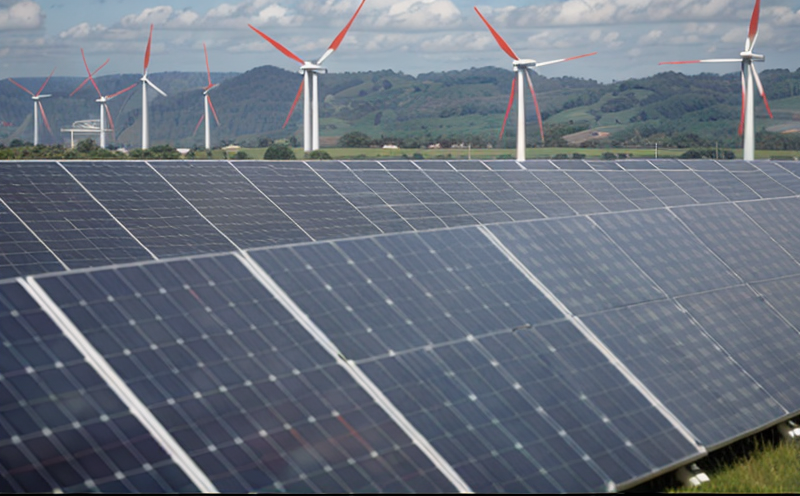Fixed Carbon Content Analysis
The analysis of fixed carbon content plays a pivotal role in the evaluation and optimization of renewable energy systems within agriculture and forestry sectors. This service is essential for ensuring compliance with international standards and optimizing the performance of biomass-based energy solutions, such as biofuels and biopower generation.
Fixed carbon refers to the portion of the solid fuel that remains after combustion or pyrolysis processes have removed volatile components like water, hydrogen, oxygen, and other gases. Understanding fixed carbon content is crucial for several reasons:
- Biomass Quality Control: Ensures consistent feedstock quality by monitoring variations in carbon content.
- Energy Yield Estimation: Predicts the calorific value and energy output of biomass materials.
- Process Optimization: Helps refine combustion processes to maximize efficiency and minimize emissions.
- Benchmarking: Provides a standardized measurement for comparing different types of biomass across various regions.
The process involves several critical steps, including sample preparation, drying, ash removal, and final combustion. The precision of these procedures directly impacts the accuracy of fixed carbon content analysis results.
At Eurolab, we employ state-of-the-art equipment such as TGA (Thermogravimetric Analyzer) and STA (Simultaneous Thermal Analysis), which adhere to international standards including ASTM D3174 for biomass materials. Our team ensures that every test is conducted in accordance with these guidelines, ensuring reliable and consistent results.
Understanding the fixed carbon content of biomass fuels helps stakeholders make informed decisions about their energy use. For instance, higher fixed carbon content indicates a greater potential for energy extraction, which can influence procurement strategies and operational planning. Furthermore, accurate knowledge allows for better integration of renewable energy systems into existing infrastructure without compromising efficiency or sustainability.
Our service not only aids in quality assurance but also contributes to the broader goal of sustainable resource management by providing insights that support responsible use of natural resources. By leveraging detailed fixed carbon content analyses, organizations can enhance their commitment to environmental stewardship while simultaneously improving operational performance.
Why It Matters
The importance of fixed carbon content analysis cannot be overstated in the context of renewable energy systems. This service is fundamental for several key reasons:
- Biomass Fuel Optimization: Accurate measurement ensures that biomass fuels are used efficiently, reducing waste and maximizing energy output.
- Environmental Impact Assessment: By understanding the fixed carbon content, stakeholders can assess the environmental footprint of their operations more effectively.
- Regulatory Compliance: Adherence to international standards like ASTM D3174 is essential for meeting regulatory requirements and ensuring market access.
- Economic Benefits: Optimized processes lead to cost savings through reduced raw material costs and improved productivity.
These factors underscore the necessity of precise fixed carbon content analysis in modern renewable energy systems. The insights gained from this service enable informed decision-making that aligns with both sustainability goals and business objectives.
In addition, understanding fixed carbon content helps to identify opportunities for innovation within agriculture and forestry sectors. For example, it can guide the development of new types of biomass fuels or the enhancement of existing technologies. By continuously refining methods used in this analysis, we contribute to a more efficient and sustainable approach to energy production.
Benefits
- Informed Decision-Making: Provides critical data for optimizing biomass fuel use and enhancing operational efficiency.
- Sustainability Enhancement: Helps in the responsible management of natural resources, contributing to long-term sustainability goals.
- Cost Reduction: Enables organizations to minimize waste and improve productivity through optimized processes.
- Regulatory Compliance: Ensures adherence to international standards like ASTM D3174, facilitating market access and compliance with regulations.
- Innovation Support: Supports the development of new technologies and fuels by providing a foundation for informed decision-making.
- Environmental Impact Mitigation: Assists in assessing and reducing the environmental impact of energy production processes.
Eurolab Advantages
At Eurolab, we pride ourselves on providing comprehensive and reliable fixed carbon content analysis services tailored to meet the unique needs of our clients. Here are some key advantages:
- Expertise and Experience: Our team consists of highly trained professionals with extensive experience in agricultural and forestry testing.
- State-of-the-Art Equipment: Leveraging advanced TGA and STA instruments ensures accurate and consistent results.
- Compliance Assurance: Every test adheres to strict international standards, ensuring that our clients meet regulatory requirements.
- Dedicated Client Support: We offer personalized support throughout the testing process, from sample preparation to final report generation.
- Prompt Turnaround Times: Our efficient processes allow for quick turnaround times without compromising on accuracy or reliability.
- Confidentiality and Security: Client data is handled with utmost care, ensuring confidentiality and security at all stages.
Our commitment to excellence in fixed carbon content analysis underscores our dedication to supporting sustainable practices within the agriculture and forestry sectors. By choosing Eurolab for your testing needs, you gain access to a wealth of expertise and resources designed specifically to drive success in renewable energy systems.





